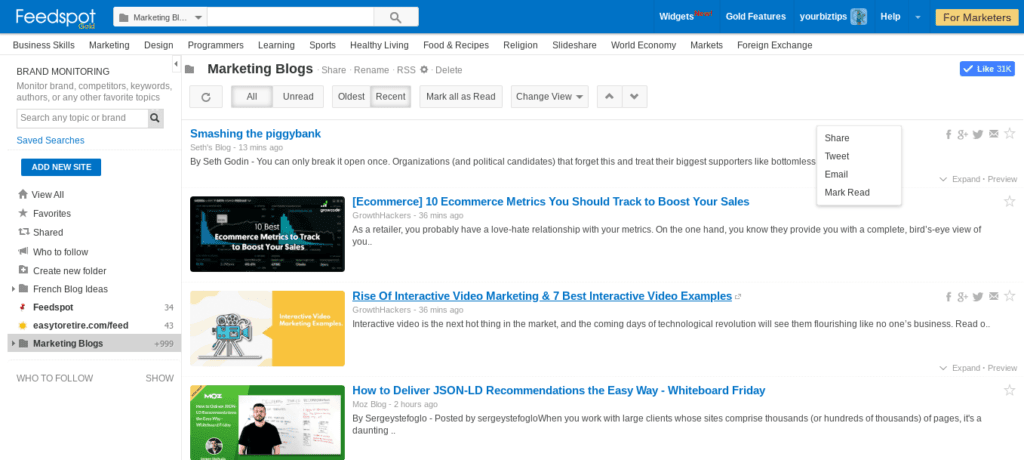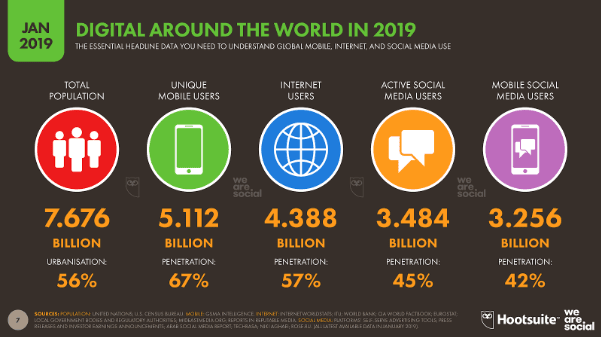How Can You Know What Your Audience Wants?
Do you know what your audience wants? What your visitor was looking for when he landed on your blog or website? In short, do you have a way to know?
In the first place, your reader came to your website for one and only reason … to find the answer to his question. His question was the word or words he entered in his searches. This question lead his to your blog. Therefore it is important that he finds the answer in your blog post.
In other words, continually posting value-added content is not always easy. On the other hand, netizens who read your articles want new knowledge, inspiration, and why not motivation?
For that, it’s simple: you must innovate, always give useful information for your reader to remain faithful to you, and come back for more.
Seth Godin, author of “Permission Marketing“, is a very interesting American author in the marketing field. He suggests a simple thing “do not look for customers for your products, look for products for your customers“.
But how do you know what your audience really wants?
There are no miracle methods, but together we will look at some simple techniques to put in place to avoid as much as possible a dud with your future publications, okay?
So, first of all …
Define your target
By typing queries in the search engines, a user has only one goal: to find THE site owner or THE article writer who will know exactly what his audience wants, his needs. So, if he visits your site, he wants to know that you will answer his questions in a relevant way.
This is where it becomes important to know the target of your articles. It will then be easier for you to define the needs and desires of your readers.
Know who you are talking to
You must know who you are talking to in your articles. Do your readers share the same profession? The same hobby?

Ask yourself if you are addressing:
- A particular genre
- A defined age range
- People from the same region or city
- A specific social group
- etc.
As you can see, the targets can be multiple. Therefore, by defining them more precisely, you will be able to know the desires of your readers better and you will know on which points it will be necessary to insist in your articles.
Focus on their needs
Now that you know who your article is intended for, you should make a list of the queries that users could make to find the topic that concerns them.
I advise that you make use of the most simple but advanced keyword research tool that is Jaaxy. It is very useful for finding the most relevant expressions that can be searched for.
Every day, millions of queries are typed into the search engines, by identifying and analyzing correctly the most searched keywords, you will only better understand the needs of the Internet users you target.
Moreover, Olivier Roland, in his book, for the french readers: “Tout le monde n’a pas eu la chance de rater ses études” (Everyone did not have the luck to miss his studies), recommends writing at least once a month a “Pillar” article with interesting and useful content that can spark even more interest than your previous articles.
Your reader wants to learn things easily, be inspired by your articles. With this famous “Pillar” article, you will awaken his curiosity even more. Also, the topics can be diverse and varied!
For example, tell yourself that you must help the reader to visualize the solution through your article. Constantly analyze the keywords that concern the subject of your articles, then you will know what are their desires and needs in real time.
Remain constantly on standby
Sounds like not being possible right? But let us see together how we can be constantly on standby.
Understanding what your readers want implies that you must analyze your own site or blog and find out what is going on in the niche you have chosen.
Of course, no need to do extensive research for several hours every day, you could lose a lot of time without being effective.
For example, a permanent watch, say 20 minutes every day to optimize your website to its best, can be sufficient.
Also, do not forget to plan occasional, more specific and more thorough watches from time to time.
There many sites that can help you do that, such as Feedly. I personally use Feedspot. So, all you need to do is to enter the blogs and websites that you wish to follow and each time a new content is published, you are notified on the platform. This is essential for an effective monitoring.

Analyze your site
To know what your audience wants can be very simple. Once you understand what it is that they really want, you will have a pretty good idea of whether you are heading in the right direction or not.
Ask yourself the right questions :
- What are the most read articles?
- Most commented?
- The most shared?
- The least read?
- etc.
By properly reviewing your articles, you will know which articles are the most popular. Analyze the statistical data well and you will understand why these articles are the most popular.
And for that, Google Analytics will undoubtedly be a very good partner! Free and easy to access, it will give you all the information you need to develop your website:
- Geolocation of your readers. Convenient if you are heading to a particular geographic area.
- Equipment used. You will then be able to know the priorities of the optimizations to be done on your site.
- Bounce rate. Very important element to know the performances of a page of your site!
- Provenance of the traffic (direct traffic, research, …).
- The most viewed pages.
- Demographics that will tell you the age and gender of your readers.
- etc.
Very useful for increasing the traffic of your website and to know which direction you need to take from there.
And thatś not all! You can find many other interesting features.
Analyze sites that are of the same niche as yours

It’s simple: Use what’s around you to better understand people.
By analyzing your own site, you now more or less know what your audience wants from YOU. By leaning on competing sites, you will be better able to understand the expectations of Internet users in general.
Browse the various websites …
- Do competitors who target the same target as you do have a different approach?
- Do their most popular articles all point to the same theme?
Analyze the techniques of your competitors. Did you spot catchy titles? Types of titles that seem to attract more clicks than others? I invite you to read one of my past articles explaining how to write a powerful title that attracts clicks. This way, you will better understand why some titles attract more users.
Create a relationship with your readers
The one that will best explain the desires of your audience is your audience itself.
Create a real connection with your readers. You will know better and better their expectations and especially the mistakes not to commit.
Take their opinion into account
Internet users who browse a site usually expect to find a comment area at the end of the article they read.
Although some of them will only leave a “thank you for this article”, others will try to leave a more elaborate, more complete opinion about your article or the ideas you mention.
Some people will want you to explain how to complete a task step by step. Others will want to know practical ways and shortcuts to do things, without getting tired.
These comments can have a certain quality and give you essential information: an advice, a justified criticism, a shy opinion … a comment of quality will only allow you to discover new development paths for your site.
And if you answer them, as you should, it can only be better! You then establish a real human relationship with your readers: you show them your open-mindedness and your desire to improve just for them.
Do not hesitate to browse over the comments left by users on the articles of your competitors as well. An inspiration, a revolutionary idea can happen at any time!
The ideal is to use polls as with Google form for example. You will directly ask what your reader needs. What’s better than having your questions answered by your readers directly?
Between what you want to write and what your readers want to read, there may sometimes be a huge gap!
Here is one of my polls for example:
A survey helps to better know what your audience wants and to be able to react.
Be connected to others
According to “We are social Singapore“, at the beginning of this year (2019) we were 3.484 billion to be active on social networks. The interaction is immediate, simple and effective. You see what I mean?

Internet users need to know your personalities before reading your article. They want to feel your passion, and especially know that they can trust you. Social networks will make it easy for you since it is one of the best ways to talk to someone.
So, be active; participate in discussions; respond to comments, even if it is a simple “nice article!“. Your reader will know that you are listening to him.
Go to forums and chat with people (do not forget to drag a link to your site in your signature after one or two weeks of exchange); create polls on your Facebook page; be part (or better, create! ) a community on a blog …
In short, there are a thousand and one ways to get closer to your readers.
For my part, although I should try to do better in this area, I particularly like the idea of creating a YouTube channel.
Internet users see you as you are, with your shambles and your messy hair (if you are not bald like me). It’s also a way to connect with your audience and inspire them with confidence.
In short, the more links you create with users, the more you will know about their expectations. And the more you know, the more complete your articles will be!
Conclusion
It’s never easy to know if an article will please your readers. Despite your calculations, your analyzes, it is possible that your article is a big flop because yes, it is impossible to predict the future at 100%.
I listed in this article some of the ways that I use to better understand the expectations of my audience. Writing articles naturally requires constant vigilance, but I also strongly advise you to create and maintain a good relationship with your audience.
I have learned early on in my Internet Marketing career that to write well, one must read more than one writes, it is almost a rule.
This will only help you to visualize your readers’ expectations, desires and increase your knowledge on the subject.
Thanks for reading this guide …

I hope that you have retained a few tips from this article that will help you know what your audience really wants.
If you have any suggestions, we would love to hear from you.
And, if you have any questions, please use the comments’ area below. You should normally receive a reply within the next 48 hours.
If you enjoyed reading this article, please share it socially. Also post a comment with us here below, I will be very grateful!
As a Premium Member at Wealthy Affiliate, I learned how to share my passions with the world. You are very welcome to become part of my team of very successful netpreneurs. You too can become a successful business owner and live your laptop life. I will be your personal mentor for FREE. It is 100% FREE to join, learn and earn! Click the button below and let’s …


Hi John!
Great post and very useful for people who are new to this, making a blog and don’t know much about what their audience wants, specially if they have a small audience. I think one of the most helpful tools for this is Google Analytics, like you mentioned in your article, and helps me know more about the people who visit my site. I also try to find for other blog similar to mine, like you wrote about, and see what they lack and what I think me as a reader would prefer to read and learn about. Probably seeing this from the user’s point of view can help me understand better what they want to find in my blog. I think I still have a lot of things to improve for my blog, but your post is a great guide to understand my audience better.
Best,
Mariana
Thanks for reading my blog post and for taking the time to comment Mariana. I am glad that you enjoyed it and that you found bits that will help you improve your blog.
That’s right, there are many tools that we can use to learn what our audience likes to see when they arrive on our blog. Which one is best to use depends on the one you feel comfortable with.
I look forward to seeing you on my blog again soon Mariana.
By the way, have you seen my latest article? ~~> What Is the Yoast Seo Plugin About ?
Please do let me know what you think, okay?
Best wishes,
John
Hi John,
This is a very informative post, thanks for this. I agree that building relationships with your website visitors is a good idea. Comments sections like this one are are a great way to do that. You can point them to other posts that may be relevant to them. It is also good to show search engines that your website is active and alive. This is something I am doing more of on my own websites.
Thanks so much for being a regular visitor to my website Tom, and for your most useful comments. As you say, the comments section is probably the best place to find out what your readers want.
Just in case, have you read my last couple of article? Please do let me know what you think:
– How to Start a Blog That Makes Money
– Blog Design Choices You Need to Pay Attention To
Thanks very much and have a great day.
John
Living the laptop life is hilarious. I found myself laughing as I was reading through your page. It was very captivating. I also could not agree more with the message of marketing to a niche. Your gravtar at the bottom is a nice touch too. Thank you for sharing this post
Thanks very much for reading my article and for taking the time to comment Chris. I am glad that you found my blog post interesting. If you liked this one, I am sure that the two selected posts below will also captivate you:
– What Is the Best Product to Sell on Amazon
– Is Affiliate Marketing the Best Way to Make Extra Money from Home?
I look forward to your precious comments.
Best wishes,
John
This is a very informative post. I learned some important points about creating quality content. An audience were opted to your website by searching the keyword of something they needed and to find the answer or solution they are looking for. To build a better connection with your audience you must offer them a helping hand not selling them. Thank you.
I’m glad that you found some interesting and useful chapters on my blogpost Joemer. Thanks for taking the time to share your views with us. I have selected a couple of past articles for which I would value your thoughts very much. They are …
– How To Make Real Money With A Blog
– How to Retire on Little Money
Thanks very much and have a great day.
John
Hi John! This post has been super helpful! Finding the answer to this question (what does our audience want?) can make the difference between a successful site and an unsuccessful one.
What you have commented concerning remaining constantly on standby, has got me thinking. I’ll definitely put this into practice. Thank you very much!
Great to know that you’ve got something to work on from my blog post Henry. If you have any questions please do not hesitate to contact me at any time.
I wish you the very best,
John
Hello John,
Thank you for your great post, it is really useful. I absolutely agree with you it is absolutely necessary to know your audience – the visitors they would be interested in the topic you are writing about or you try to sell.
About the articles and content – I have to admit I picked the Niche, which allows me to follow my intuition, I do not use some analyses yet, but I feel I am on the right path. But some people try to use analysis (Google Analytics, Facebook pixel etc.) and find out what the audience is, other people go differently and find the audience by emotion/intuition. As far as it works, that’s what matters.
Still, I find your post very comprehensive and important to know for the business.
Thank you and I am looking forward to another one of yours.
Bye Renata
Thanks for your interesting comment Renata. As you say, there are many ways to find out what your audience expects of you. It is up to you to decide which one you are more comfortable with. You can also combine two or three systems so that you have a more accurate view of what your audience wants.
To make sure that you do not miss any of my future posts, all you have to do is to sign up for my newsletter ~~> NewsLetter
I wish you the very best Renata.
John
I think it all starts with outlining the target audience. For any niche, a sliver of the population will take to your articles and overall website. For instance, if I were to start a blog on the history of the Cleveland Browns, my main geographic target would be Northeast, Ohio since it’s in the location of Cleveland, or namely Cuyahoga County. A team like the Browns, especially a history site pertaining to them, might fare better with middle-aged to older adults nationwide since the team had been on hard times since 1990, while most football aware age-groups would be ready and willing to read my material in Northeastern Ohio. This is just one of many, thousands, of niche examples when it comes to zeroing in on that target audience.
Great example Todd, thanks for sharing your thoughts on the subject. I am glad to see that you are a faithful reader of my blog and your comments are always very much appreciated.
I hope that some of my readers will take into consideration your comment as it is a great add on to my article.
I wish you the very best,
John